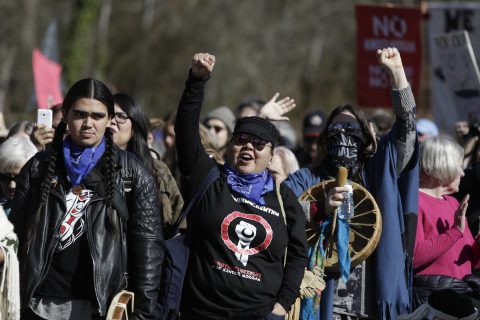
By Michel Comte
Agence France-Presse
OTTAWA, Canada (AFP) — The Canadian government is expected to give a green light Tuesday to a controversial Pacific pipeline expansion, setting the stage for a major political battle ahead of elections.
Prime Minister Justin Trudeau’s government had approved the expansion linking Alberta’s oil sands to the Pacific coast in 2016 on grounds it was in Canada’s “national interest.”
But the project has been stalled by legal challenges and protests by indigenous groups and environmentalists, and a federal court in August ordered the government to take a second look.
Trudeau’s cabinet convened a morning meeting to reach a decision on whether to proceed, and was widely expected to approve the expansion. The decision was to be announced at the close of markets.
The project would expand an existing pipeline to deliver 890,000 barrels of oil a day from landlocked Alberta to the Pacific coast for shipment to overseas markets.
The government, after an initial environmental review, concluded it was needed to ease Canada’s reliance on the US market, boost local production and get a better price for its oil.
But environmentalists and indigenous people worry that increased shipping from a marine terminal in Vancouver would impede the recovery of local killer whale populations.
The issue confronts Trudeau with a dilemma.
The pipeline’s most vocal opponents are normally key Trudeau supporters. And yet failure to get it built could spell economic trouble for one of Canada’s top industries while plunging Trudeau into a political fight with Canada’s provincial governments over environmental policy.
Trudeau’s Liberals have more seats at stake in the upcoming October election in westernmost British Columbia, where opposition to the pipeline is strongest, than in oil-rich Alberta.
Standing up for the oil patch also runs counter to Trudeau’s championing action on climate change. Late Monday, parliament passed a motion declaring a national climate emergency and reaffirming measures to curb CO2 emissions.
– Climate versus oil –
But if the Trans Mountain project is rejected, his government will be stuck with an aging pipeline it bought last year for Can$4.4 billion (US$3.3 billion) from Kinder Morgan to salvage the troubled expansion project.
And this would give ammunition to Trudeau’s main rival, Conservative leader Andrew Scheer, who has tapped into oil sector grievances since oil prices plunged in 2015.
Scheer has gained a slight lead in recent polls promising to roll back environmental protections, while echoing provincial leaders who warned in an open letter that the federal government’s resources management is having “detrimental effects on national unity.”
In addition to lamenting a lack of new pipeline capacity, oil proponents have also taken aim at Trudeau’s push to strengthen environmental assessements on major new energy projects, saying the new law will dash plans for any future pipelines.
“It’s absolutely irresponsible for conservative premiers to be threatening our national unity if they don’t get their way,” Trudeau shot back.
“Anyone who wants to be prime minister, like Andrew Scheer, needs to condemn those attacks on national unity.”
Further complicating matters, a deal Trudeau had reached with Alberta to impose a carbon tax as well as a cap on CO2 emissions from its oil sands in exchange for increased pipeline capacity has come apart.
The oil sands are the world’s third-largest oil reserve as well as the single largest polluter in the country, and so any effort to meet Canada’s Paris Agreement target of reducing CO2 emissions by 30 percent from 2005 levels by 2030 must include Alberta.
But a new Tory government in Alberta this month walked away from those commitments.
© Agence France-Presse
